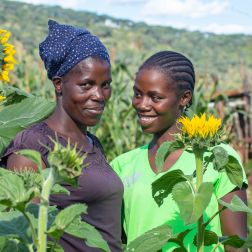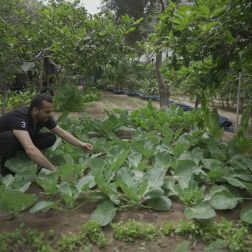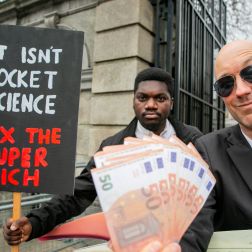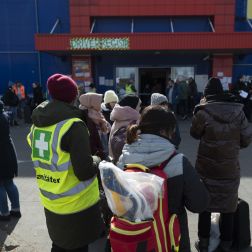- 4 mins read time
- Published: 18th August 2015
Seven in 10 Irish support overseas humanitarian support
Seven out of 10 Irish people are proud of the country’s generosity in supporting humanitarian relief efforts, according to a recent survey by Oxfam Ireland released as part of World Humanitarian Day, the 19th of August.
To mark this, Oxfam’s Colm Byrne reflects on his trip to CAR and the effect of humanitarian crisis there.
Where is that?” almost everyone replied when I told them I was going to the Central African Republic (CAR). The clue in the name not being enough, they then searched the web to learn more and if truth be known, so too had I once. Information, at least in the western media, is sparse. It is clearly not without reason that this landlocked country bordered by some of the African continents most conflict affected states - Chad to the north, Sudan to the north east, South Sudan to the east, DRC and Congo to the south – was once referred to as “the Phantom State”.
In 2012, the country experienced its fifth coup d’état since independence in 1960 sparking extreme violence as Christian self-defense groups (anti-Balaka) fought with the fractured Muslim rebel alliance (Séléka) that had brought a new President to power. The humanitarian consequences were devastating as 6,000 people died and almost a million were displaced within the country and to the surrounding states with only French and UN intervention preventing still greater catastrophe.
Today CAR is again largely out of sight and out of mind as Communities struggle to recover and reports suggest dangerous food shortages in many parts of the capital Bangui. This is in no small part because the local markets, the lifeline of commercial activity providing both access to food for the city’s inhabitants and a means to earn an income for traders, have been disrupted. Territorial lines drawn between once neighbourly Communities limit the movement of both traders and consumers for fear of violence both within the city and beyond. Trapped, local traders told me “we were like slaves”. Maqil, who buys and sells oxen told me he cannot now travel safely to the countryside to buy them. Even aid convoys are being attacked in CAR as banditry is common.
Some traders too were robbed or beaten during the fighting and to add to their woes are now left without capital with which to resume or sustain trade and so provide for their families. I met Anna, a member of one of over a hundred local trade groups who are receiving training and cash grants from Oxfam to restart their businesses, who invited me to take a short walk to her stall. It’s meagre stock of just 5 pieces of cloth and 3 handbags said everything. And there are no social protection mechanisms in the form of social welfare or insurance schemes to fall back on here.
But for Anna and other traders like her, the talk is not now of handouts or more aid as trade group names such Sara Agayé (Do anything to become something) and Wali Guida Loudo (Women of Guida Get Up) serve to prove. These are proud and resilient Communities who despite living in the most difficult of circumstances ask no more than a step back up on the ladder. And the traders, working together as united communities regardless of religious identity, plan to return better than before too. Ali, another trader, tells me that “now we have learnt about marketing, know how to use and save our money effectively and understand better now the importance of quality”. “Before we didn’t save or plan” said Anna “but the training has provided us with habits, taught us how to sell and engage with our customers”. The Sara Agayé group plans to buy tools and higher quality seed e.g. Japanese and Italian cabbage, which will allow them to sell higher quality produce at a higher price.
Beneath the optimism however, there exists a very real fear of being forgotten again. Conflict affected Communities in the Central African Community have been promised much by the international Community before and remain cautious about whether even committed support might ever materialise. As I leave the city, the market is flooded ….. not with consumers but with seasonal rains. The traders remain steadfast by their stalls and from the comfort of my passing car I try to take a photograph of a committed phone card salesmen standing knee deep in water. These traders will not give up….but they do ask for a step up.
EU and Oxfam work together to help refugees and other vulnerable groups in humanitarian and conflict situations around the world. Your continued support makes this possible. Read more at eusavelives.org




